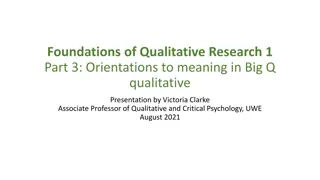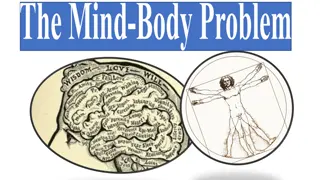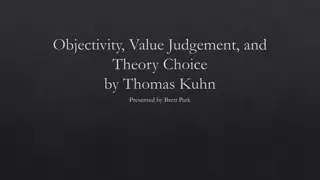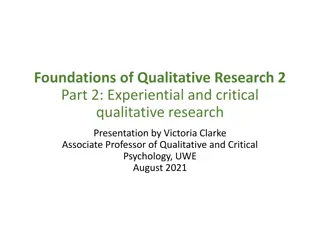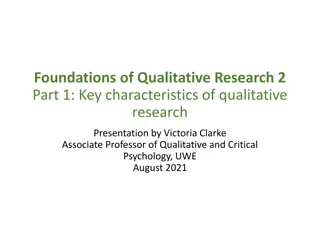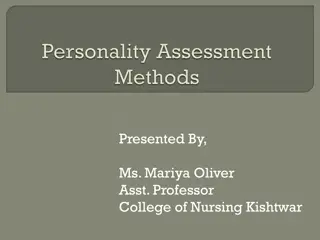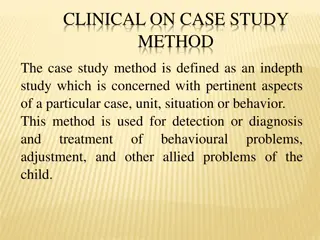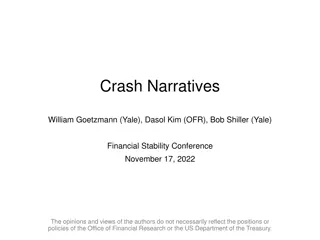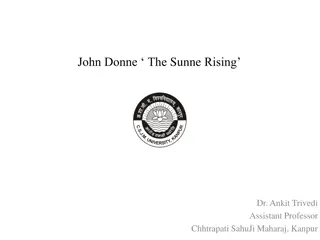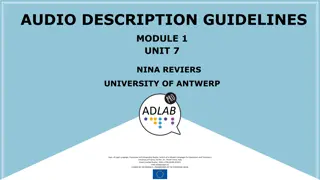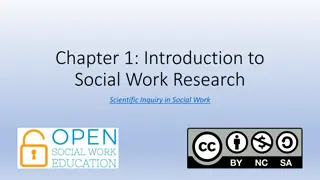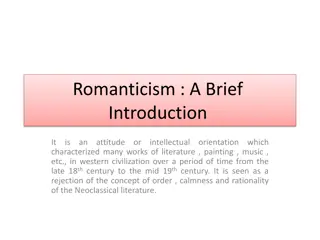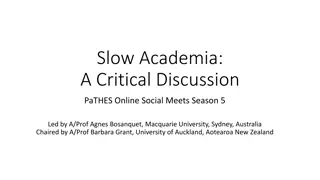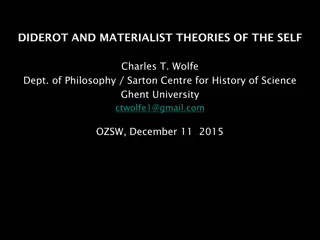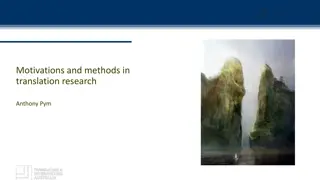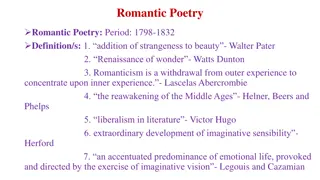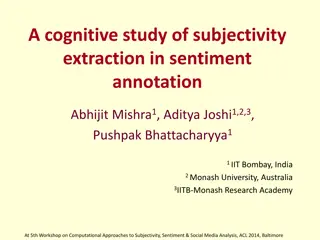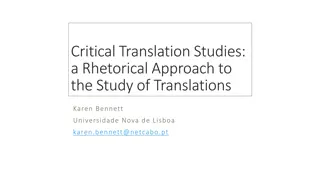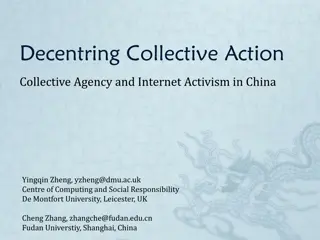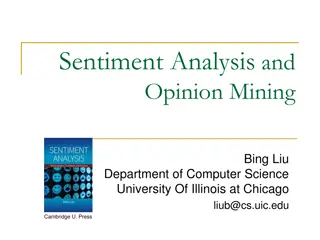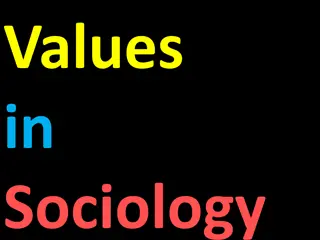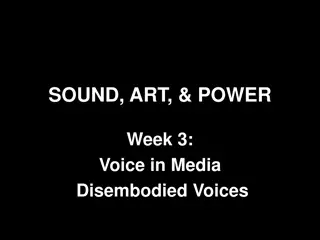Advantages and Disadvantages of Case Study Method in Research
The case study method offers in-depth insights into social units, revealing behavior patterns, motivations, and historical perspectives. It aids in constructing questionnaires, enhances researcher experience, and facilitates the study of social changes. However, limitations include lack of comparabi
1 views • 7 slides
Understanding Qualitative Research: Foundations and Orientations
Explore the foundations of qualitative research and orientations to meaning in Big Q qualitative methods. Delve into the values, characteristics, and theoretical underpinnings of qualitative inquiry, and reflect on the significance of meaning-making in research. Consider the role of subjectivity in
0 views • 23 slides
The Mind-Body Problem: Exploring Consciousness and Intentionality
Delve into the intriguing questions surrounding the mind-body problem, such as the nature of consciousness, intentionality, subjectivity, and causation. Explore the mysteries of how thoughts, beliefs, and sensory experiences interact with the physical body and the external world. Contemplate the eni
0 views • 33 slides
Objectivity, Value Judgement, and Theory Choice in Science
Thomas Kuhn's work explores the subjective elements in theory choice, highlighting that theory selection is not solely based on objective algorithms. He discusses the structure of scientific revolutions, where science shifts between normal and revolutionary phases. Kuhn's ideas have faced criticisms
6 views • 19 slides
Understanding Experiential vs. Critical Qualitative Research
Delve into the foundations of qualitative research with a focus on experiential and critical approaches. Explore key concepts, defining characteristics, and theoretical foundations, distinguishing between qualitative and quantitative research. Reflect on different orientations, subjectivity, and ref
0 views • 16 slides
Exploring Key Characteristics of Qualitative Research in Psychology
The lecture series delves into the values, characteristics, and theoretical foundations of qualitative research, emphasizing the differences from quantitative methods. It explores experiential and critical qualitative camps, subjectivity, reflexivity, and ontological and epistemological foundations.
4 views • 18 slides
Understanding Personality Assessments in Interviews
Personality assessments in interviews are valuable tools for evaluating a candidate's characteristics, abilities, and aspirations. Various types of assessments, such as structured and unstructured interviews, personality inventories like the Minnesota Multiphasic Personality Inventory, the Big Five
1 views • 28 slides
Understanding Clinical Case Study Method: Steps, Merits, and Limitations
The clinical case study method involves an in-depth study of specific cases to diagnose and treat various behavioral issues, especially in children. This method includes steps such as collecting data, analyzing and interpreting it, writing reports, and suggesting remedial measures. It offers the ben
0 views • 10 slides
Understanding the Role of Media Narratives in Shaping Market Perception
This paper delves into the impact of financial media narratives post-market crashes and their influence on collective memory, investor behavior, and market volatility. It highlights the association between crash narratives, market indicators, and investor responses, emphasizing the contagious nature
0 views • 22 slides
Analysis of John Donne's Poem "The Sunne Rising
John Donne's poem "The Sunne Rising" humorously portrays a lover chiding the sun for interrupting his time with his beloved. The speaker asserts that love transcends time and space, elevating his relationship to a cosmic importance. Through hyperbolic assertions, Donne explores the intense subjectiv
2 views • 8 slides
Translation Strategies and Equivalence Models in Modern Translation Studies
In modern translation studies, the concept of equivalence and different translation strategies are explored. Scholars have debated the subjectivity involved in translation, with some advocating for a descriptive approach while others stick to prescriptive discussions of equivalence. Influenced by pa
0 views • 10 slides
Exploring Hamlet's Interiority and Individual Identity
Delve into the complex themes of interiority, individual identity, and consciousness in Shakespeare's "Hamlet." Follow Hamlet's journey as he grapples with the idea of self, memory, and existence, challenging traditional notions of identity and embracing a modern sense of subjectivity. Analyze key s
0 views • 16 slides
Insights into Artistic Research: Definitions, Nature, and Key Points
Delve into the realm of artistic research through reflections from international seminars, definitions, and key characteristics. Explore the specific nature of this discipline, methods used, and its role in promoting arts development. Discover the critical aspects like academic rigor, enhancing know
0 views • 18 slides
Audio Description Guidelines in Modern Languages for Translators and Interpreters
Explore the various types and importance of audio description guidelines, covering topics like what to describe, when and how to describe, and dealing with thorny issues such as subjectivity and film techniques. Discover the differences between general approaches and strategies, along with examples
0 views • 17 slides
Understanding Social Work Research and Evidence-Based Practice
Explore the significance of social work research, cognitive biases, objectivity vs. subjectivity, and evidence-based practice. Learn how social workers gather knowledge, apply cognitive biases, distinguish between subjective and objective truths, and utilize evidence-based practice to enhance client
0 views • 9 slides
Understanding Romanticism: A Brief Introduction to Literary Movement
Romanticism, a significant literary movement from the late 18th to mid-19th century, emphasized individuality, subjectivity, emotion, and the supernatural. It marked a departure from Neoclassical ideals of order and rationality. Key characteristics include subjectivity, spontaneity, love of the supe
0 views • 8 slides
Engaging with Slow Academia: A Critical Discussion on Theorizing and Self-Reflection
Join the thought-provoking discussion on slow academia led by experts from Macquarie University and the University of Auckland. Explore theoretical works resonating with slow academia, feminist perspectives, institutional responses, subjectivity theorizing, and more. Engage in a reflective, inclusiv
0 views • 15 slides
Complexity of Narrative Construction in Francophone Caribbean Literature
Exploring the intricacies of narrative construction in Francophone Caribbean literature, this lecture delves into the distinctions between fabula and syuzhet, the impact of authors' authority on storytelling, and the portrayal of Caribbean subjectivity and authority. Through examples from notable po
0 views • 11 slides
Understanding For-Sale and For-Lease Real Estate Projects
Exploring the differences between for-sale and for-lease real estate projects, this content covers key concepts such as absorption, discounted cash flow valuation, and pathways to profit in investments. It compares the objectives, loan amortization lengths, and profit generation strategies for each
0 views • 16 slides
Materialist Theories of the Self: Diderot's Perspective
Materialism, as explored by Diderot and other philosophers, delves into the intricate relationship between mind and matter. Diderot questions the nature of the self and challenges Cartesian anti-materialist views. He considers the self as an organic unity, emphasizing the interplay of external relat
0 views • 11 slides
Understanding Motivations and Methods in Translation Research
Delve into the complex intertwining of subjectivity and objectivity in translation research, exploring the role of motivations, ideologies, and knowledge dissemination. Discover the application of strong empiricism in formulating hypotheses, testing validity, and refining understanding through data
0 views • 21 slides
Exploring the Romantic Era: Poetry, History, and Major Poets
A detailed exploration of Romantic Poetry from 1798-1832, encompassing the defining characteristics, historical background, major poets including Wordsworth and Keats, and the influence of key events like the French Revolution. Romanticism is characterized by subjectivity, imagination, love for the
0 views • 4 slides
Cognitive Study of Subjectivity Extraction in Sentiment Annotation
A cognitive study on extracting subjectivity in sentiment annotation, exploring if humans perform subjective extraction similarly to machines for sentiment analysis. The study investigates sentiment oscillations and different methods adopted based on the nature of subjective documents.
0 views • 14 slides
Rhetorical Approach to Translation Studies: Challenges and Perspectives
This study explores the emergence of a rhetorical approach in Translation Studies, aiming to counter empiricism and highlight the importance of subjectivity and interpretation in translation. By examining paradigms in Translation Studies, it contrasts the scientistic drive for objectivity with a hum
0 views • 34 slides
Decentring Collective Action in Internet Activism: A Study on Collective Agency in China
This study explores the concept of collective agency in internet activism within the context of social movements in China. It discusses the role of ICT in virtual collective action, the structural preconditions for collective action, and the shift towards a more decentralized approach to collective
1 views • 16 slides
Understanding Sentiment Analysis and Opinion Mining
Sentiment analysis (SA) or opinion mining is a computational study of opinion, sentiment, appraisal, evaluation, and emotion, which plays a crucial role in influencing behaviors and decision-making processes. This field has gained significance with the rise of social media, offering insights into pu
0 views • 62 slides
Exploring Values in Sociology: A Critical Analysis of Objectivity and Subjectivity
Delve into the complex interplay between objectivity and subjectivity in sociology, examining whether true value-free research is achievable. Classical sociologists like Comte, Durkheim, and Marx are scrutinized for their perspectives on the role of values in sociological inquiry, challenging the no
0 views • 17 slides
Exploring the Power of Voice in Media and Art
Delve into the significance of disembodied voices, unique perspectives by scholars like Adriana Cavarero and Jacques Derrida, and the interplay between voice, truth, and subjectivity in Western traditions. Uncover the complexities of vocality in various cultural contexts and cinematic representation
0 views • 44 slides

